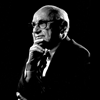As I write this in Chicago, lines are forming at those gas stations that are open. The exasperated motorists are cursing; the service-station attendants are fuming; the politicians are promising. The one thing few people seem to be doing is thinking.
How is it that for years past, you and I have been able to find gas stations open at almost any hour of the day or night, and have been able to drive up to them with complete confidence that the request to "fill up" would be honored with alacrity and even with a cleaning of the windshield? To judge from the rhetoric that pollutes the air these days, it must have been because there was a powerful Federal Energy Office hidden somewhere in the underground dungeons in Washington, in which an invisible William Simon was efficiently allocating petroleum products throughout the land, riding herd on greedy oil tycoons lusting for an opportunity to mess things up and create long lines at their gas stations.
Of course, we know very well that the situation is precisely the reverse. The lines date from the creation of a real Federal Energy Office run by a very visible, able and articulate William Simon. Which is the cause and which the effect? Did the lines produce the FEO or the FEO the lines?
After the Arabs cut output, Germany imposed no price controls on petroleum products. It did initially restrict Sunday driving but soon removed that restraint. The price of petroleum products jumped some 20 or 30 per cent, but there were no long lines, no disorganization. The greedy consumers found it in their own interest to conserve oil in the most painless way. The greedy oil tycoons found it in their own interest to see to it that petroleum products were available for those able and willing to pay the price. Other European countries, like the U.S., imposed price controls. And, like us, they had chaos.
The Arab cut in output can be blamed for higher prices, but it cannot be blamed for the long lines. Their creation required the cooperation of shortsighted governments.
The world crisis is now past its peak. The initial quadrupling of the price of crude oil after the Arabs cut output was a temporary response that has been working its own cure. Higher prices induced consumers to economize and other producers to step up output. It takes time to adjust, so these reactions will snowball. In order to keep prices up, the Arabs would have to curtail their output by ever larger amounts. But even if they cut their output to zero, they could not for long keep the world price of crude at $10 a barrel. Well before that point, the cartel would collapse.
The effects of consumer and producer reactions are already showing up. The European countries that introduced rationing and restrictions on driving have eliminated them. World oil prices are weakening. They will soon tumble. When that occurs, it will reveal how superficial are the hysterical cries that we have come to the end of an era and must revolutionize our energy-wasting way of life. What we have been witnessing is not the end of an era but simply shortsightedness.
At home, unfortunately, our problems will not be over so soon. The panicky FEO forced oil companies to shift so much production to heating oil that we face a glut of heating oil but a paucity of gasoline. The FEO’s allocations among states have starved some, amply supplied others. Its order that refineries operating at high levels must sell oil to those operating at low levels sounds fine. In practice, however, it reduces the incentive for the recipients to buy oil abroad and produces a wasteful use of oil at home.
We have the worst of both worlds: long lines and sharply higher prices — indeed, higher than I believe they would have been without the waste resulting from FEO controls.
Is rationing the solution? Far from it. It is the problem. We already have rationing of producers and distributors. Coupon rationing of final consumers would simply be the hair of the dog that bit you.
The way to end long lines at gas stations is to abolish FEO and end all controls on the prices and allocation of petroleum products. Within a few weeks, your friendly dealer would again be cleaning your windshield with a smile.
How can thinking people believe that a government that cannot deliver the mail can deliver gas better than Exxon, Mobil, Texaco, Gulf and the rest?
Copyright Newsweek, Inc., March 4, 1974. Reprinted by permission.

